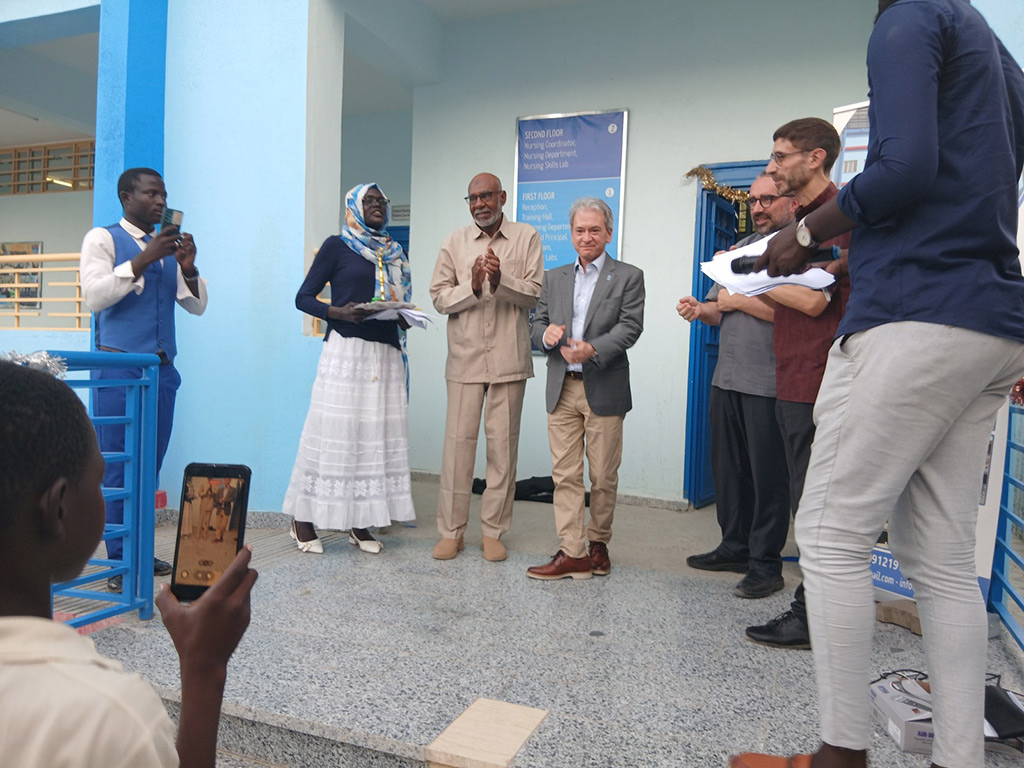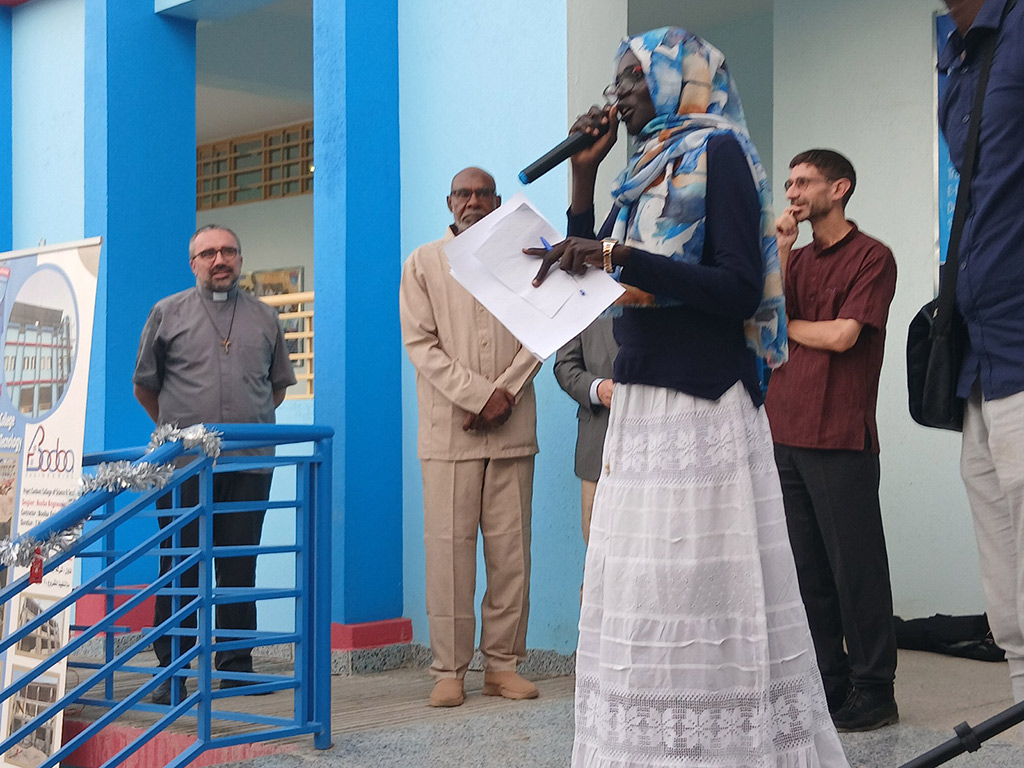Inauguration speech, Fr. Jorge
Towards the end of 2023, the Minister of Higher Education and Scientific Research encouraged universities to re-locate in safe places in order to resume academic activities from 15th October. Comboni College of Science and Technology found some abandoned rooms inside the Comboni Secondary School from where we started organizing our academic activities. We transformed the old science lab of the school into a small nursing skills lab for the students of the BSc in Nursing, arranged a couple of offices for the staff and developed a computer lab in collaboration with the school.
From such a simple structure, we could coordinate the work of 36 university lecturers spread all over Sudan, Egypt, South Sudan, Saudi Arabia, Paris, Italy, Spain, Nairobi, Uganda and South Sudan; a small number of students of the university programs who varied between 123 and 203; a great number of online students of Italian language that amounted 249 in 2024, most of them in the diaspora; and the activities of the nursing department with the community.
With the extraordinary support of the Italian Agency for Development Cooperation (AICS), AISPO and some private donors including persons and associations from Spain, Italy and members and friends of the Haggar family, we went much beyond the resumption of academic activities. We would also like to underline the support of the Ministry of Health and Social Development of Red Sea State to take these steps. In May 2024, the College opened the first “nursing clinic – palliative care hospice” of the country.

This clinic offers a service so much necessary to persons with terminal and chronic diseases in the community and their families. At the same time, the clinic links the College with the community and coordinates a network of volunteers in the community who transform it without any political, ideological or tribal motivation. Muslim and Christians, Beja, Nuba, South Sudanese, Shaigi, Jaa’li volunteers are moved by mercy towards the weakest persons of the community. In 2024, in the framework of the project executed in collaboration with AISPO and the Ministry of Health and Social Development of the State, we trained 203 volunteers. Some of them are really active and support the families of persons with terminal and chronic diseases in collaboration with the nursing team.
This clinic is small. But I believe that it is very important for Red Sea State and the whole country as a small seed of mustard tree that will grow and provide shadow to hundreds of persons. This small and humble clinic gives dignity to the nursing profession. It is registered under the name of a nurse and a woman, PhD Halima Ibrahim Malik Ali. It expresses how much well trained nurses can do in the community. And, secondly, it is a palliative care hospice that is conceived as a platform to provide the service mainly at home so that persons who are suffering gain dignity and quality for their lives.
The clinic and the group of volunteers, that continues growing in collaboration also with the Popular Committees of the State, express the vision of Comboni College and Science and Technology and its core values. We encouraged our students to join the volunteers so that they can experience the beauty of service and assimilate that what they learn in the College should be put at the service of the community. At the same time, their collaboration with volunteers from different ethnical, religious and cultural groups who share compassion for the weak makes them experience a model of society totally different to the one based upon power and particular interests.
Digital Transformation
In these months of work in Port Sudan, the College combined these activities with the community with an accelerated digital transformation. This process has led to the development of lecturers’ e-teaching skills in collaboration with the Polytechnic University of Valencia and the University of Nicosia, the access to three electronic libraries, the introduction of a proctoring application for the exams and an information management system to integrate registration, academic records, accounts,…

A new building
In June 2024, one of the donors of the building in Khartoum we had started in 2022 and left unfinished as a consequence of the war, MISEREOR (Episcopal Conference of Germany), informed us that the funding was available just until 30th June 2025. At that time, considering the need of having offices to continue managing our activities, of enlarging the nursing skills lab and of improving the quality of our online and face-to-face work, the College Founders approved the creation of this building we inaugurate today, which was built in a record time between November 21, 2024 and June 14, 2025 thanks to the efficiency and capacity of Booba Group, to whom we are also very grateful.
The building is innovative in terms of sustainability. It is not just fully fed with solar energy in spite of having 17 air conditioner devices (dual inverters), but the condensed water of those devices is recycled and provides the necessary water for the building.
It is made of three classrooms and the clinic in the ground floor; three offices in the first floor, a study room, a video-conference hall in the first floor; two offices and the nursing skills lab for the nursing department in the second floor. Our previous office and the computer lab are now connected to the new building through iron stairs.
The future
The chairman of the Board of Founders and the external financial supervisor of the College came back from Khartoum on 14th June after visiting our premises around Qasr Avenue. The area looks a desert. No people move around. The electrical cables of all the area have been unearthed. The rehabilitation of the electrical infrastructure, water provision and fibre optics will require time. We are also worried with the development of the conflict in Kordofan and Darfur and the possible attacks by RSF to Khartoum State via drones. With all these question marks about the near future, these new premises guarantee the continuity of our activities as a higher education institution independently of the evolution of the conflict. But also these premises guarantee our presence in Red Sea State in a way that time, the development of the conflict and the dialogue with the Ministry of Higher Education and Scientific Research and the local community will define.
We wish to reopen our headquarters in Khartoum but at the same time, we will not leave Red Sea State whenever that happens.
Final words of thanks
I would like to close this speech with some more words of gratitude. First of all, I would like to thank the trust and resilience of our students; secondly, I would like to thank the wonderful staff of the College, those who are here, some of them after going through very critical moments in Khartoum, Wad Medani and Senar, and the staff who work with us online from different places.
I would like to thank Comboni Secondary School that opened its doors to us and, in particular, Fr. Martin and Mr. James Joseph, the headmaster; Sacred Heart Parish and the Parish Priest, Fr. Pious Anyaja, who provided the space to start the clinic; the Comboni Missionaries in Egypt- Sudan and the Archbishop of Khartoum who supported our applications to the donors who funded this building: the Episcopal Conferences of Italy and Germany and their respective governments; the Ministry of Higher Education and Scientific Research who facilitated the process to continue providing education to our dear students; the Ministry of Health and Social Development of Red Sea State and particularly the General Director, Dr. Ahlam Abdelrasoul, the National Council of Medical and Health Professions; the NGOs who are collaborating with the clinic to support persons with terminal and chronic diseases: Islamic Relief Worldwide, the Sudanese Organization for Reconstruction and Development and Music for Peace; and finally AISPO and AICS whose support was essential in 2024 and with whom we expect to continue collaborating.

